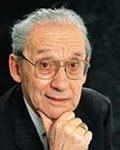
Born in Valence, France, (1913-2005), was Professor of History of Philosophy at the University of Strasbourg (1948-1957) and professor of philosophy at the Sorbonne University (1957-1967), after teaching at the University Paris-Nanterre until 1987 in 1970 he joined the Department of Theology at the University of Chicago. He was also a visiting professor at Yale, Montreal and Louvain, among others. Ricoeur's philosophical education is linked early on to the names of Husserl, Heidegger, Jaspers and Marcel. In 1939 he was taken prisoner and spent the war in various concentration camps. This event will mark his life and work with a haunting question about the problem of evil, lack and suffering. His religious commitment and intellectual formation always walked together, but within a strict division of labor: biblical exegesis, on the one hand, and the philosophical task, on the other. Author of a vast and varied oeuvre, its contribution to the design and development of hermeneutics makes him liable, with Hans-Georg Gadamer, in what is known as "the interpretive turn in philosophy." Among his numerous titles translated into Castilian include Time and Narrative (1987), Oneself as Another (1996), The Rule of Metaphor (2001), Memory, history, forgetting (2003) Finiteness and guilt (2004) and roads recognition (2005), the last four published in this same Editorial.





